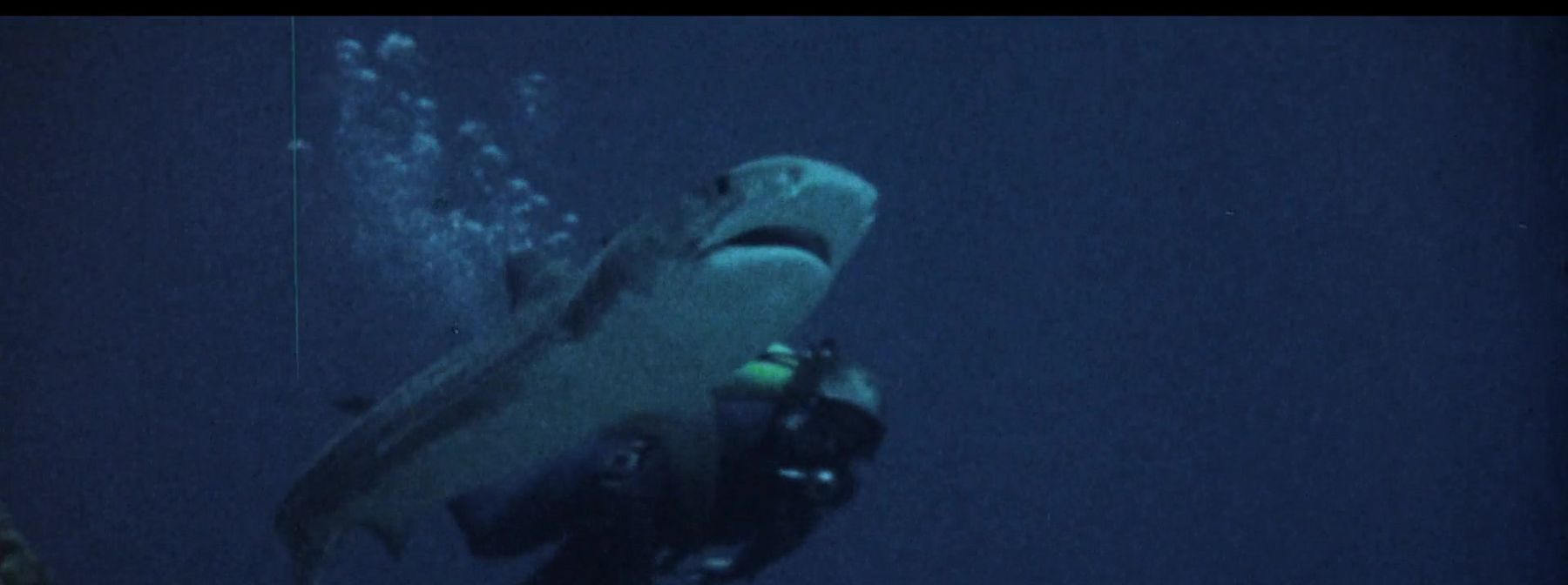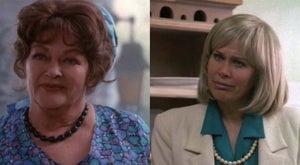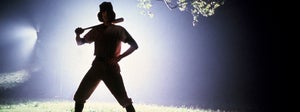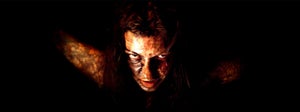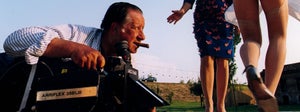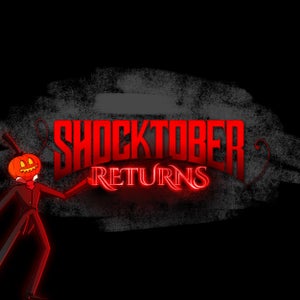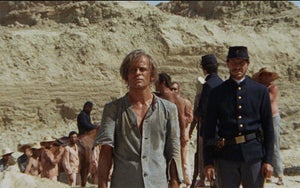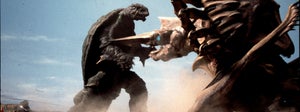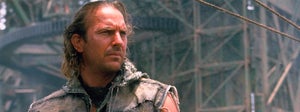
By Caroline Lichnewsky
Following the success and enthusiasm of our previous #AskArrowVideo, we decided to set up another chance for you to ask those burning questions to one of your favourite cult directors and the one and only William Grefé was more than happy to oblige! Without further due, let’s discover some of the secrets behind the swamp that Grefé has been hiding from us for all those years!
What’s the one unmade concept you have that you wish you made?
WG: I had one script called Nothing But Bodies, which is a real interesting horror script. Whatever Happened To Valerie? was another open. Then I had one called Escape, a chase through the mountain type thing.
I have dozens of scripts - some of which I wrote, some which I bought - which have never been made. The crazy thing about the film business, some deals I worked on for a year, a year and a half, to get the finance and they never actually came about. Some of them I really believed in, and I fought and fought to get the money, and the money never came about, and then all of a sudden some deals just fell into my lap.
When I did The Hooked Generation, the guy was a multi-millionaire, and I read in the paper that he’d made $20 million on his stock. I called him up, went in to see him, BOOM! The guy just wrote me a cheque the next morning - some deals fell into your lap like that. Other deals I just worked and worked and worked and they never happened. So if anybody out there wants me to do another film I’ve got tonnes of scripts!
What I found from experience, some of the deals we used to put together with general partnerships and limited partnerships, you’ve got twenty investors and they went into it, but what happens is everybody has an attorney and an accountant, so to get twenty people to get past their attorney or accountant… but a guy with twenty or thirty millions dollars - BOOM! You get the money.
The guy that backed The Hooked Generation and The Naked Zoo was a guy named Cliff Perlman, and he had taken a small restaurant chain, Lum’s restaurants and he went public with it and took the stock from $1 a share to $100 a share. I was with him and Ivan Tors, who was exec producer on Flipper and Gentle Ben, in a restaurant in L.A, and it was probably about ten o’clock at night. An Ivan happened to say, “you know, my attorney’s got an interesting deal, he represents Caesar’s Palace in Las Vegas, and they’re going to sell it.” And Cliff says: “How much do they want for it?” Ivan says “I don’t know…” and Cliff says: “Get him on the phone! Do you have his home number?” Back then they didn’t have cellphones. It was a pretty exclusive restaurant, the waiter comes over and plugs the phone in. Ivan introduces Cliff to his attorney, Cliff says, “How much do they want for Caesar’s Palace?” “Sixty million dollars.” Cliff says: “I’ll be in your office in the morning, I’m buying it.” Like that! Now, this is like 10.30pm. He calls up his brother Stu in Miami, wakes him up, says, “Stu, sell twenty millions dollars worth of stock in the morning and buy Caesars Palace.” That's how heavyweights deal… people futz and futz forever, you know...
Do you have a favourite film or a favourite filmmaker?
WG: I always like John Frankenheimer. What I like about him was the way he blocked - he would do close-ups, an over-the-shoulder shot, a dolly shot, a wide shot - some of these shots would last three, four, five minutes… very difficult to do because every actor has hit their marks perfect, the assistant cameraman has to follow focus.
What drives me crazy, and I guess a lot of the young filmmakers will agree with me, when I see a fight scene today in movies, it’s fast cuts, fast cuts, fast cuts, fast cuts. So many fast cuts you don’t know who the hell is fighting who. You look at older movies, like Gunga Din [1939], when they have a fight scene or a big action scene, you knew what was happening.
If you look at my film The Hooked Generation, where they’re in the cabin, Willie Pastrano and Steve Alaimo have a big fist fight. The way I blocked that, you know who’s hitting who and what’s going on. Fast cuts, fast cuts, a chimpanzee could direct that! To direct a scene where the camera moves and the actors move and you know what’s going on, that takes talent, so that’s why I like Frankenheimer so much.
His film Seconds is very good, I like Six Days in May. My daughter Melanie is an assistant director, and she did a film with him, Andersonville, about the Civil War prison they had. I met him several times, a really nice guy, a shame he died before his time.
Why did your film The Psychedelic Priest not get released in the 1970s?
WG: Because the producer Terry Merrill was completely nuts! Terry went in to see the distributor and they started arguing over the deal, and Terry ended up wanting to fist fight the guy, so the guy blackballed Terry! An interesting story about how that film came about - Terry was out in Los Angeles, calls me up and says, “Bill I’ve got a great idea for a film.” He gave me the pitch - a priest travels with all the longhairs because all of the hippies were in California, sleeping in doorways and up in the hills. So I said: “It sounds terrific, why don’t you send me the script?”
He says there isn’t time, that he needed me need to jump on a plane and get out there. I tell him I’m a little around the block, it doesn’t quite work that way. You send me a round trip ticket, and half my fee, and I’ll come out… a week later the envelope comes with the round trip ticket, and half my salary. So I go to L.A - and Terry says “Bill I’m in serious trouble. I don’t have a script.” I said “what the hell did you bring me out here for?” He says “look, look, let me tell you the story I have in mind.” Anyway, he raised about 50 thousand dollars, in what’s called trading stamps. Trading stamps was a real weird deal they had in L.A. at the time. Let’s say you owned a TV store, and I owned a garage - if you needed your car fixed, instead of paying me cash you paid me in trading stamps. If I wanted a TV set I’d go to you with the trading stamps. So he’d raised all these trading stamps but no cash - so he’d sold some of the trading stamps for 50 cents on the dollar, to get half my salary. Anyway, I said, look Terry, you want me to direct this thing, forget it. Let’s see what happens when you get some money.
Long story short, we did the film with real hippies, the kid who played the priest had never been in a movie before, he came out to Los Angeles wanting to be in the movies, the girl was a real hippy we picked up in a restaurant. We had a three man crew - a sound man, an 18-year-old kid was the so-called grip, and me. It was a nightmare because we used real hippies and all of that, how the thing ever got edited together I never know. I just winged the whole thing, improvised everything. Back then Topanga Canyon was the big hippy stronghold, so I said let’s go to the Topanga Canyon and see what’s happening. If you watch the film that’s the river that goes by, we improvised that whole scene. The only scene I’m really proud of in that film is the hippy girl is pregnant, and has a baby. We were out in the desert. I had a flight back to Miami - and the flight left at seven at night. And here we’re out in the desert, at one in the afternoon. So we picked up these hippies, and we created this pregnant scene, and I directed and shot the whole thing, her having the baby in the van, in like fifteen or twenty minutes… you do this, boom boom boom! with a handheld camera. To me it turned out the best thing in the whole movie.
I had become president of Ivan Tors Studio, and it was a family-oriented organisation - it did Flipper, Gentle Ben, family films. I didn’t want to be associated as a director on a drug-related hippy film… so I was credited as a cameraman. At the time I was glad it didn’t get released!
Which of the films that you directed do you consider the best?
WG: It’s hard to tell you which is my favourite, but I liked the ones that made the most money. Stanley [1972] probably made more money than any of my films. If you can believe this, I shot that for $125,000. It opened in Los Angeles against The Godfather, which was the biggest most expensive film Hollywood had. The Godfather grossed $181,000 in Los Angeles. Stanley grossed $175,000. Only six thousand less. Stanley turned out good, Mako, The Hooked Generation. One film that not many people have seen, which I liked, The Devil’s Sisters. Then there’s Impulse. People loved seeing William Shatner as a psycho killer. Impulse will be coming out in about six months on Blu-ray.
If you could remake one of your films with a studio budget, which one would you choose?
WG: That’s a tough question, I really can’t say. Some of the early films, like Sting of Death or Death Curse of Tartu would get laughed out of the theatre today when they see the jellyfish creature, but back then it was the big thing you know. I got a call from a guy in Atlanta - some guy came into a tattoo parlor, and he had Tartu tattooed onto him! I love all you grindhouse fans. When I made these films, I thought, oh they’re going in the theatre and that’s the end of them. Then they ended up on TV, then VHS, then DVD, now they’re on Blu-ray. Who the hell knows what they’ll be on next. Anyway, God love you grindhouse people.
How come Michael J Pollard wasn't credited in The Wild Rebels?
WG: Michael J Pollard was not in The Wild Rebels [Pollard was in fact in Roger Corman’s The Wild Angels from 1966]. I got a funny story on Michael though. I was in New York, and I was with a songwriter and we went into a restaurant in Greenwich Village, and Michael J was sitting there all by himself, and this songwriter drank double Bacardis on the rocks. Michael J was on the table next to us, and he orders a double Bacardi on the rocks. The songwriter says “Hey Michael, you’re the only guy I know who orders double Bacardis on the rocks”, and Michael says: “Hey baby, I order these to come right back from where I am!” He was so drugged out, he was drinking Bacardis to come down from whatever drug he was on. Funny little guy.

